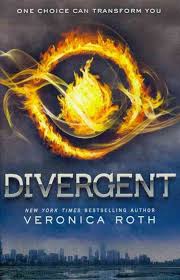Roth, Veronica. (2011). Divergent.
New York, NY: Katherine Tegen Books.
Series Book – Divergent
Divergent
has been on the New York Times’ Best
Seller List for Young Adults for 14 weeks now; it is currently ranked as #3,
and I can definitely see why. Out of the
fifty books I have read for this class, Divergent
is by far one of my very favorites. There
were a few similarities throughout the story to The Hunger Games, another of my favorites, including The Choosing
Ceremony, the strong female heroine, a controlling and crooked government
system, and revolting against the leaders, but Veronica Roth’s plot is very
different. I was hooked to the story
from the very beginning. I was very
intrigued by the idea of the five factions each living by a single core value, by
Beatrice being Divergent and what it meant, and by her instant connection with
Four, and I could not wait to find out if Beatrice would survive the Dauntless
initiation.
In addition to the plot, I
could not help but identify with the main character, Beatrice Prior, who
struggles with being selfless and brave throughout the book, something I
struggle with myself. Torn between her
home faction Abnegation and chosen faction Dauntless, Beatrice undergoes
several difficult tests - physical, mental, and emotional - as she completes
the Dauntless initiation process. But
through it, she faces her fears, discovers herself, and realizes that being
selfless and brave are not that different.
And in the end, even though she is ranked #1 out of the initiates after
the final test, she has to leave Dauntless behind, own her Divergence, and join
forces with her family in Abnegation to save the faction from the Erudite and
Dauntless leaders who wish to destroy it and gain control of the
government.
I was also drawn to the
underlying theme of good vs. evil throughout the book. This theme is evident both outwardly with the
good attempting to overthrow the corrupt leaders, and inwardly with Beatrice’s
daily struggle of making good and bad decisions, just as it is in the real world
today. Even though the creators of the
factions intended for them to eliminate those qualities they believed were
responsible for the world’s disarray and war, in the end, as Beatrice’s mother
stated, “human beings cannot be good for long before the bad creeps back in and
poisons us again” (Roth, 2011). We need
to be reminded of this message daily as we remember making good and bad
decisions is a constant struggle, and even when we mess up, we have to be
determined next time to do better.
I anxiously await getting
to read the sequel to this book, Insurgent.

No comments:
Post a Comment